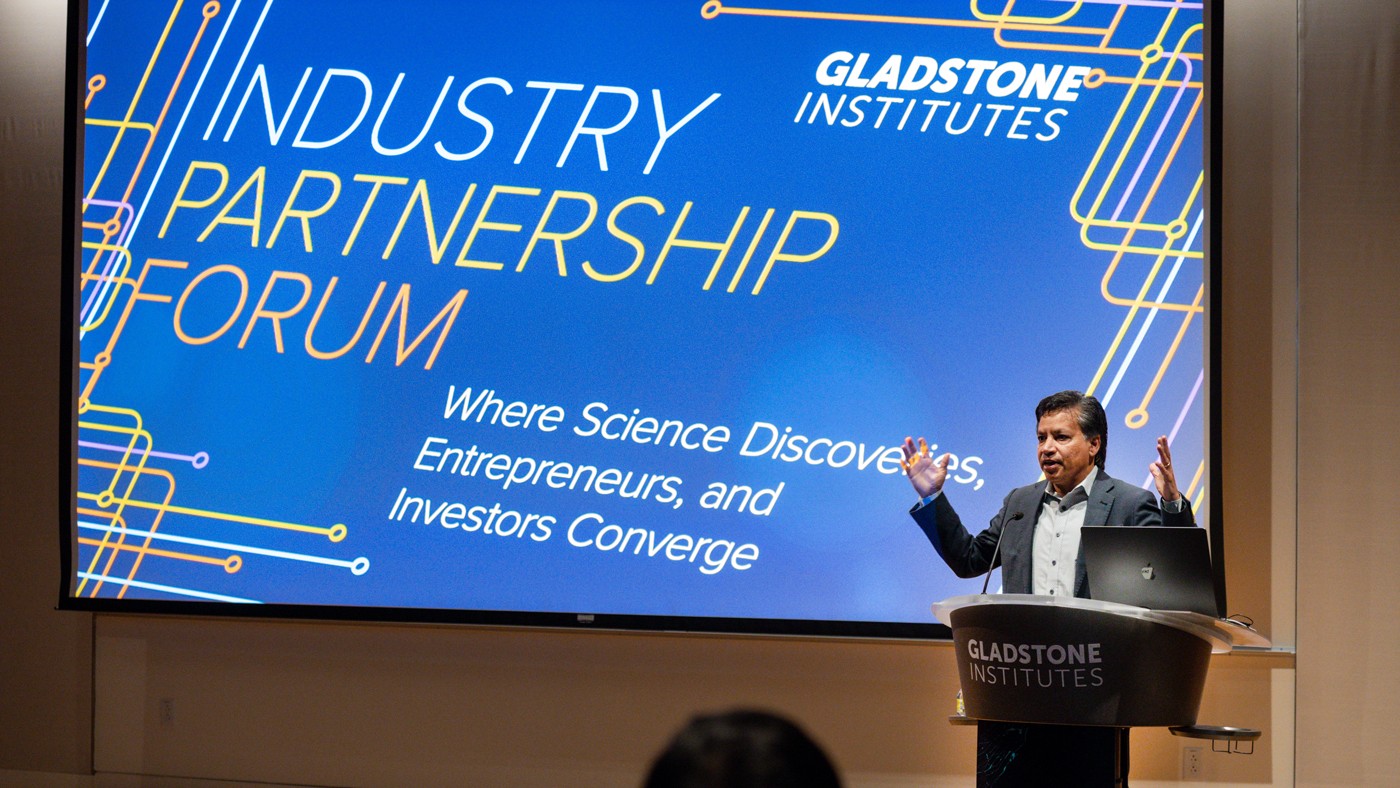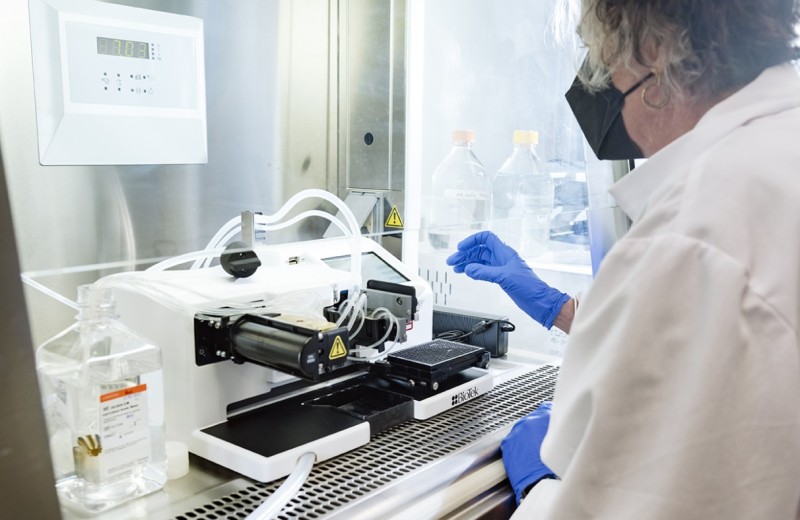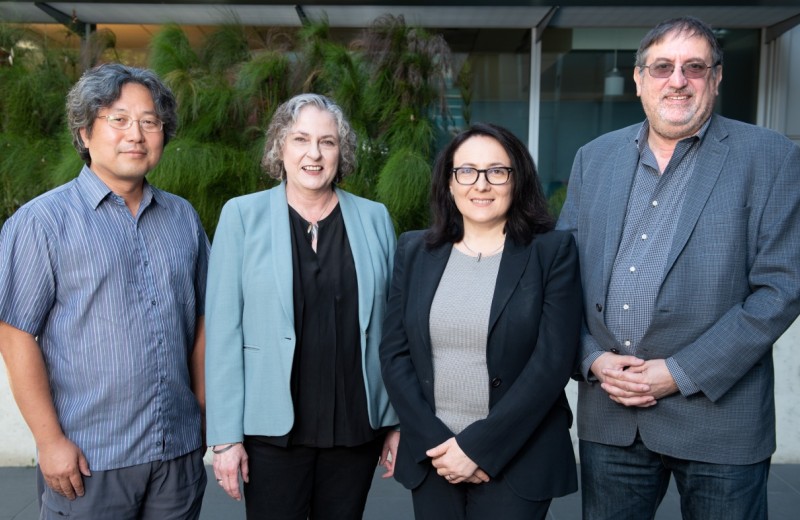Gladstone NOW: The Campaign Join Us on the Journey✕

Gladstone President Deepak Srivastava, MD, speaks at the inaugural Industry Partnership Forum in October 2022.
When Forbes announced its “Healthcare 30 Under 30 List” in December, 2023, the magazine underscored the impact of the Industry Partnership Forum, an annual event hosted by Gladstone Institutes to present promising discoveries to potential investors. Included on that list was Ivana Muncie-Vasic, PhD, who, while completing doctoral research at Gladstone, presented her concept for a next-generation in vitro fertilization (IVF) technology at the inaugural 2022 forum.
Muncie-Vasic had discovered a potential new strategy for addressing infertility by generating oocytes (immature egg cells) directly from blood cells, using induced pluripotent stem cell technology. Her presentation drew strong interest from the audience and culminated in $4.2 million in backing from several investors. Muncie-Vasic now serves as CEO of Vitra Labs, a spinout company based on her discovery.
Now in its third year, the Industry Partnership Forum continues to demonstrate measurable success in the many partnerships formed, companies launched, and drug candidates advanced. The 2024 forum will again feature a slate of 15-minute pitch presentations by Gladstone scientists followed by a 7-minute Q&A session. Among this year’s line-up are President Deepak Srivastava, MD, and Nobel laureate and Senior Investigator Shinya Yamanaka, MD, PhD. The day-long event takes place on September 9 in Gladstone’s Mahley Auditorium.
“Discoveries made here at Gladstone can benefit society in multiple ways, either by broadly sharing important scientific findings and allowing others to build on them, or by forming spinout companies that aggressively advance these opportunities."
Research With a Purpose
Although basic scientific research continues to be the foundation at Gladstone, the organization’s byword has always been “research with a purpose.” So, when a eureka moment occurs in the lab, the Corporate Liaison and Ventures (CLV) team, led by Vice President Stephen Freedman, PhD, helps move that breakthrough forward.
“Discoveries made here at Gladstone can benefit society in multiple ways, either by broadly sharing important scientific findings and allowing others to build on them, or by forming spinout companies that aggressively advance these opportunities,” says Freedman.
With more than 40 years of combined experience in drug development, as well as access to a vast network of industry professionals and investors, the CLV team proves a valuable ally in preparing a discovery for its public debut.
“Once we’ve identified an advancement with potential, our team works with the laboratory group to outline the next steps and identify the key milestones needed to create a path for partnering or investment,” says Ariel Brumbaugh, PhD, director of Biosciences Business Development within the CLV. “We also help the investigators develop a business plan and prepare an effective pitch deck, and we use our knowledge of the commercial sector to help recruit the right drug development expertise and start targeting financial support.”
Members of Gladstone’s Translational Council—external advisors with biotechnology, pharmaceutical, and venture capital experience—lend their advice, and this year, the CLV team also recruited the Milner Therapeutics Institute. This group, based at the University of Cambridge, specializes in catalyzing partnerships between academia and industry in order to transform pioneering science into therapies.
The inaugural Industry Partnership Forum exceeded all expectations. Each of the 10 presenting groups attracted multiple requests for follow-up meetings by potential industry partners, and four new companies were spun out. In addition to Vitra Labs, Gladstone investigators launched Operant BioPharma, InvisiShield Technologies, and DirectBio. The second year saw an increase in overall attendance, with representation by big pharma and biotech companies climbing from 22 to 38, and nearly double the requests for follow-up meetings. Important connections were made and two more spinouts were created: Site Tx (formerly Function Bio) and Sprint Synthesis.
“I see industry engagement as an essential part of our mission to cure diseases,” says Srivastava. “The goal here is to impact patients in the fastest way—because we should all be working with a sense of urgency. So, when it comes to actually making a drug and taking it to market, we want to get it into the hands of experts.”
Across the board, Gladstone investigators say the Industry Partnership Forum has been crucial in helping forge the relationships that can form new companies and move their discoveries closer to patients.
Fueling Drug Discovery
Citing the slow process and high failure rate of drug discovery, especially when addressing neurological diseases, Senior Investigator Steve Finkbeiner, MD, along with Jeremy Linsley, PhD, and his brother, Drew Linsley, PhD, created an artificially intelligent microscopy system. The platform analyzes live neurons derived from patients with progressive neurological diseases and identifies the biological patterns driving that progression. It then points to drugs that can halt the process. Together, the team co-founded Operant BioPharma and presented their concept at the 2022 Industry Partnership Forum.
“The CLV team not only helped us prepare our pitch, it also highlighted which audience members we should appeal to,” says Jeremy Linsley, who began his career as a postdoc in Finkbeiner’s lab and now serves as Operant BioPharma’s chief scientific officer. “At the event, we made multiple lasting connections with the venture capital and biotech community, some of which helped us secure an ongoing deal with a large biotech company.”
Promotion doesn’t end at the Industry Partnership Forum, which often serves as a springboard to an even bigger event: the JP Morgan Healthcare Conference. Billed as the largest health care investment symposium in the industry, the annual January conference in San Francisco brings together more than 8,000 investors, government officials, and industry leaders.

Now in its third year, the Industry Partnership Forum continues to demonstrate measurable success in the many partnerships formed, companies launched, and drug candidates advanced.
Gladstone hosts a reception at the conference, where the CLV team, having already laid the groundwork, can personally introduce investigators and their breakthroughs to prospective backers or partners. They share recorded versions of the presentations delivered at the Industry Partnership Forum and distribute materials demonstrating each program’s value. Much like proficient matchmakers, they make sure the two parties exchange contact info and set a date for a follow-up discussion.
Alex Marson, MD, PhD, was one investigator who made a successful match at the JP Morgan Healthcare Conference. Director of the Gladstone-UCSF Institute of Genomic Immunology and a “serial entrepreneur,” Marson has twice delivered presentations at the Industry Partnership Forum. The CLV team saw translational promise in his work and invited him to the 2023 JP Morgan event. There, they orchestrated an introduction to a venture capital group who not only shared Marson’s vision but also helped establish Site Tx. The spinout seeks to use ultra-deep CRISPR mutagenesis (a process that alters the genetic code) in human cells—especially cells of the immune system—to capture genetic information that could improve drug discovery.
“Getting exposure early in my career to the venture capital and biotech entrepreneurial communities was crucial for my education and ability to advance our academic discoveries into startup companies,” says Marson. “I know that bridging academic efforts with industry partnerships helps drive the development of new technologies into life-changing treatments for patients. I’d like to see more researchers have these early opportunities and I strongly support initiatives such as the Industry Partnership Forum that foster these productive connections.”
In the Spotlight
With Vitra Labs currently finalizing its second round of funding, Muncie-Vasic reflects on the event that helped her realize her dream.
“The Industry Partnership Forum was such a valuable experience, especially for me, a new founder,” she says. “It helped increase our company’s exposure and expand our network—I had three investor calls after the presentation. And it played a big role in attracting one of our primary investors.”
Successes such as these keep Brumbaugh enthusiastic about Gladstone’s continued hosting of the forum. “Gladstone is a seedbed of innovation and brimming with visionary, entrepreneurial scientists,” she says. “Helping advance discoveries from academic origins into commercial development where they can ultimately benefit patients is tremendously gratifying. And the forum, which is driving these connections within the biomedical ecosystem, offers so much value to the greater community.”
“Attendees know they’re going to hear about cutting-edge science and get a preview of potentially blockbuster medicines,” Brumbaugh adds. “We make it easy for them to meet our scientists during a catered lunch and post-event reception. And we have private meeting rooms set aside with an onsite administrator who can coordinate access. It’s going to be a productive day.”
Our San Francisco Location | The Gladstone Difference
Our San Francisco Location | The Gladstone Difference
Learn how Gladstone's location fosters enriching collaborations and partnerships.
Business Development Institutional NewsCNDAP Partners with Takeda to Develop New Therapies for Alzheimer’s Disease and Related Brain Disorders
CNDAP Partners with Takeda to Develop New Therapies for Alzheimer’s Disease and Related Brain Disorders
A research collaboration to target the protein tau with small molecules
Business Development News Release Alzheimer’s Disease Neurological Disease Mucke LabNew Bay Area Spin-Off Company to Develop Drugs for Multiple Sclerosis and Alzheimer’s Disease
New Bay Area Spin-Off Company to Develop Drugs for Multiple Sclerosis and Alzheimer’s Disease
Senior Investigator Katerina Akassoglou has fundamentally changed the way scientists think of neurological disorders. She made the seminal discovery that blood leaks are toxic to the brain by promoting inflammation and destroying neurons. Her research led the scientific community to reassess the complex relationship between the brain, immune, and vascular systems.
Business Development Institutional News Assay Development and Drug Discovery Core Alzheimer’s Disease Multiple Sclerosis Neurological Disease Akassoglou Lab



